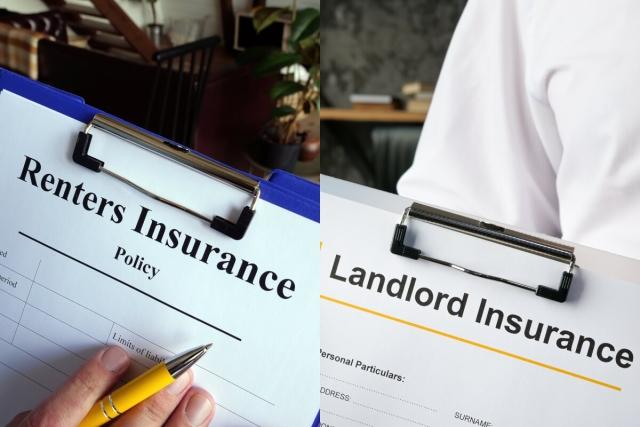Renters Insurance vs. Landlord Insurance: Why You’re Not Covered by Your Landlord
While they are both forms of insurance, renters insurance and landlord insurance are two different types of coverage. Landlord insurance doesn’t offer the tailored renter protections that renters insurance does. To see exactly how important it is for you to get renters insurance, it can help to know the differences between renters insurance vs. landlord insurance and why you’re not covered by your landlord.
Key Takeaways
- Landlord insurance does not cover renters' personal property or living expenses. It only protects the building, the landlord’s liability, and potential rental income loss, leaving renters fully exposed without their own coverage.
- Renters insurance fills crucial coverage gaps. It protects your belongings from theft or damage, provides liability coverage (even for pet-related incidents), and pays for temporary housing if your rental becomes uninhabitable.
- Many landlords now require renters insurance in lease agreements. This lowers their own liability and ensures tenants are financially protected in emergencies, making it a smart — and sometimes mandatory — investment for renters.
Why Your Landlord’s Insurance Doesn’t Protect You
Landlord insurance doesn’t protect renters because it’s designed to cover the property owner’s interest, not yours. A landlord insurance policy covers the building, liability for the landlord, and loss of rental income. What it lacks is protection for the renter’s personal property, their liability, or their living expenses during times when the property is uninhabitable.
Renters insurance is important because it covers your belongings, your liability, and your living expenses if the property becomes uninhabitable. You want to be protected in case anything unexpected happens.
Renters Insurance vs. Landlord Insurance: The Key Differences

Both landlord and renters insurance provide expansive protections, but they are only helpful to their respective party. Explore the differences between them to see why you need renters insurance.
Purpose of renters insurance vs. landlord insurance
The purpose of renters insurance is to protect you, whether it’s your belongings being damaged, liability for injuries that happen in your home, or the cost of displacement from the property. Landlord insurance provides relief to your landlord in case of property damage, financial losses, and liability if they are found responsible for injuries or damage.
Who pays for renters insurance vs. landlord insurance
Renters pay for renters insurance and the landlord pays for landlord insurance. It is each party’s responsibility to pay for and maintain the insurance that applies to them.
Coverage scope
|
Coverage |
Renters Insurance |
Landlord Insurance |
|
Property Damage |
Possibly. May cover damage to the rental property caused accidentally by the renter, under the liability portion of the policy. |
Yes. Covers damage to the physical structure of the property from covered perils (e.g., fire, storms). |
|
Personal Property |
Yes. Covers the renter’s personal belongings (furniture, electronics, clothes) if damaged or stolen due to a covered event. |
Yes. Covers the landlord’s personal property on-site (e.g., appliances, outdoor furniture), but not renter’s belongings. |
|
Personal Liability |
Yes. Provides coverage if the renter is responsible for injuring someone or damaging their property. |
Yes. Covers legal or medical costs if someone is injured on the property and the landlord is found liable (for example, if it was due to unsafe conditions). |
|
Loss of Use (Temporary Housing) |
Yes. Covers additional living expenses if the rental is uninhabitable due to a covered event. |
No. Not applicable to landlords. |
|
Loss of Rental Income |
No. Not applicable to renters. |
Yes. May cover lost rental income if the unit is uninhabitable due to a covered peril. |
Why Renters Insurance Is Essential Protection
Renters insurance is worth it as it provides coverage specifically designed for people who rent. This means:
- Your personal property is protected against damage or theft.
- Your pets are protected under liability if they cause harm.
- You have liability coverage if someone is injured in your unit or because of your actions.
- Your cost to find temporary housing is covered if your apartment becomes uninhabitable.
Imagine a fire breaks out in your apartment, damaging the building, destroying your personal belongings, and forcing you to move out temporarily. In this situation, your landlord’s insurance would cover the cost to repair the structure, but it wouldn’t pay to replace any of your items or cover your stay while the apartment is being fixed.
That’s where renters insurance steps in. It covers the cost of replacing your damaged belongings and the temporary housing expenses. This financial protection as well as liability is why renters insurance is so important for renters.
Is Renters Insurance Required? Legal and Lease Considerations

While renters insurance is not required by law, many landlords require you to get it. It provides protection to both renters and landlords in case of unforeseen events or circumstances. Landlords appreciate the reduced liability on their part, and you gain crucial liability and financial protections.
Landlords require renter insurance for several reasons:
- Mitigating the threat of a lawsuit
- Reducing their responsibility
- Finding responsible renters
- Giving the landlord peace of mind
Why You Need Renters Insurance
As landlord insurance doesn’t cover renters, you need to get renters insurance. The low amount it costs each month is well worth the peace of mind you get. If you still have questions about renters insurance, explore the subject more on Renterverse.
FAQs
Is renters and landlord insurance the same thing?
No, renters and landlord insurance aren’t the same thing. Each type of coverage provides specific protections to its respective party.
What does renters insurance not cover?
Renters insurance doesn’t cover:
- Flood and earthquake damage
- Normal wear and tear
- Roommate’s property
Always read your policy or check with your insurance agent to see what renters insurance does and doesn’t cover.
How much does renters insurance cost?
Renters insurance is usually quite affordable. It can cost as little as $10 a month. The price does vary based on location, coverage needs, property type, and other factors, but the cost rarely exceeds $30 a month.






